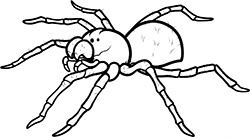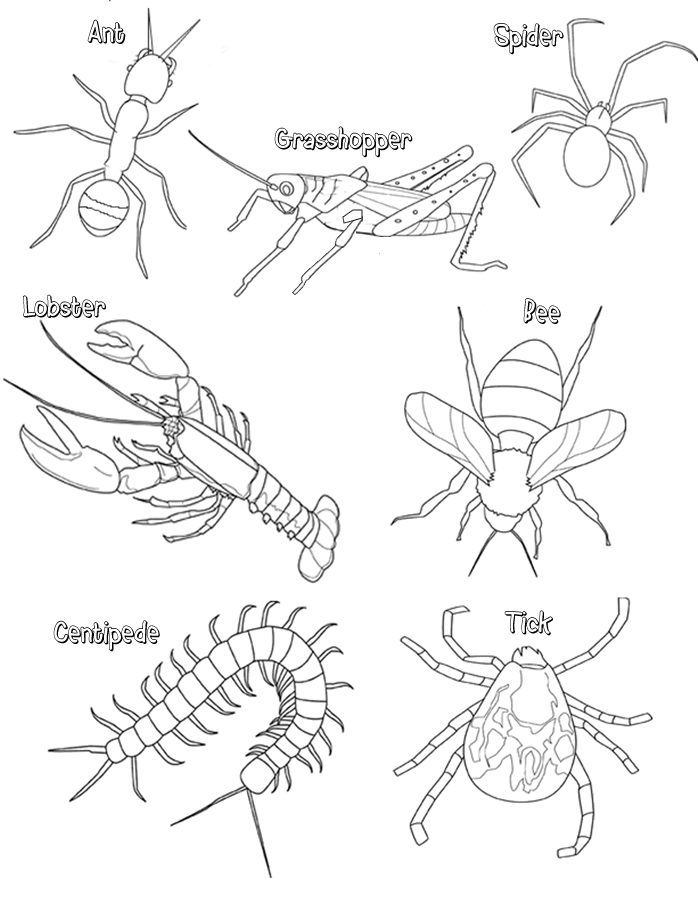Compare the Anatomy of Arthropods

 Arthropods are a group of animals
(belonging to the Animal Kingdom) that have a hard exoskeleton, body segments
and jointed appendages. There are three main groups within the Phylum Arthropoda.
Arthropods are a group of animals
(belonging to the Animal Kingdom) that have a hard exoskeleton, body segments
and jointed appendages. There are three main groups within the Phylum Arthropoda.
Insects
Insects have three body segments,
the head, thorax (middle region) and the abdomen. Often you can see segments
on the abdomen of insects. Locate all the insects on the coloring sheet and
color the head red, the thorax yellow and the abdomen green .
Insects have three sets of legs which
attach to the thorax. Color all the insect legs blue . You will also note that
each insect has a pair of antenna, color or shade over the antenna in grey
.
The mouthparts of insects have a
pair of mandibles that chew food. Unlike the teeth of other animals, mandibles
open from side to side. Locate the mandibles (they are only visible on two of
the insects pictured) and color the mandibles purple .
Some, but not all insects
have wings, which also attach to the thorax. Color the wings pink . An additional
body part can be seen on the grasshopper, and covering near the wings that is
hard and protective called the carapace - color the carapace brown
.
Arachnids
Arachnids are a group of arthropods
that include spiders and ticks. They have two body parts: the cephalothorax
(head-middle) and the abdomen. Color the cephalothorax orange and the abdomen
green
.
Arachnids have 8 legs, instead of the 6 you find in insects. Color the
legs blue . Notice that arachnids do not have antennae, but you can see the mandibles
on the spider pictured, you should have already colored the mandibles purple.
Crustaceans
Crustaceans are a group of arthropods
that mainly live in the water; they include lobsters, crabs, shrimp and crayfish.
Crustaceans usually have two body segments, the cephalothorax (orange) and the
abdomen (green)
.
The number of appendages on crustaceans can vary, and many of them have large
claws, used for capturing prey. Color the claws on the lobster brown and the
large legs attached to the thorax blue
. Notice the little legs attached to the
abdomen on the lobster which the animal uses for swimming. These appendages
are called swimmerets - color dark blue
. Crustaceans also have antennae
- color grey.
Centipede
This animal belongs to an entirely
different class from the others. Centipedes have long flat bodies and many legs.
In fact, the word "centipede" means "hundred legs", though
centipedes can actually have more or less than a hundred. Color the legs of
the centipede blue and each of its body segments red
and the antennae grey
.
Centipedes are often poisonous and are related to the nonpoisonous millipede.
Questions:
1. How many body segments does an
insect have? ____ How many legs? ____
2. How many body segments does an arachnid have? ____ How many legs? ____
3. Which groups of arthropods have antennae? ___________________________________
4. What part of the body can you see segmentation? _____________________
5. What are the chewing mouthparts of arthropods called? ____________________
6. To what part of the body do the wings attach? ________________________
7. The head and thorax are fused together in some arthropods to form the _______________
8. What does the word "centipede" mean? ____________________________________

Other Resources on Arthropods
Crayfish External Anatomy – focusing on the appendages and mouthparts
Internal Anatomy of a Crayfish – the body cavity is exposed to reveal structures such as gills and the green gland
Crayfish Virtual Dissection – images and walk-through of crayfish dissection
Grasshopper Anatomy – examines the appendages and mouth parts
Grasshopper Specimens for Dissection (Amazon)


